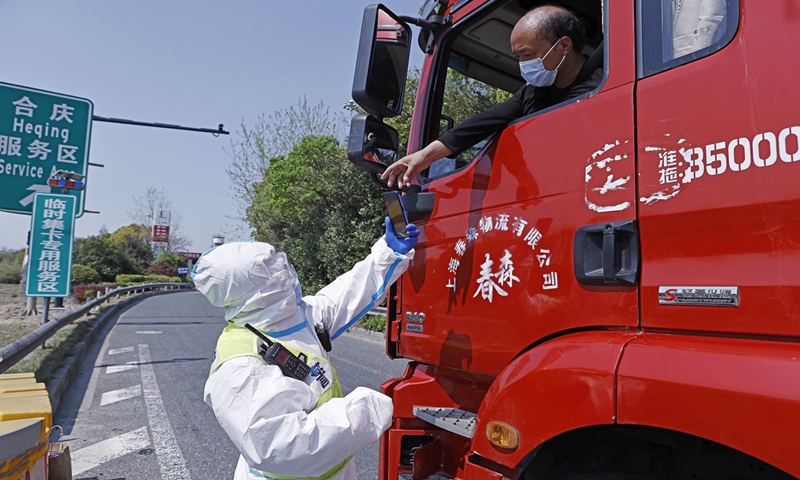
A policeman checks the nucleic acid test result of a truck driver at Heqing expressway service station in Shanghai, on April 11, 2022. Photo: VCG
Logistics providers based in the Yangtze River Delta, China's major manufacturing and trade hub, said that the traffic situation in the region is easing as more government support policies land on the ground, securing business operations while doing a good job in epidemic control.It will take time until operations fully resume in Shanghai, the center of the regional hub, but measures such as efficient digital road passes, flexible nucleic acid testing and the opening of trans-provincial highways are all contributing to business resumption in the region, the Global Times learned.
In the Yangtze River Delta area, lots of unnecessary quarantine checks along expressways have been eliminated, truck driver Zhang Yaodong told the Global Times on Monday.
"Even though more trucks are back on the road, traffic on expressways remains normal due to simplified COVID-related checks," said Zhang. He noted that he can pass most checkpoints by showing a negative nucleic acid test taken within 24 hours and a normal health code.
To make sure every truck driver can take a test every day, transport authorities set up booths at entry and exit points, service areas and toll gates along expressways, said Zhang.
Zhao Yong, a manager with a Shanghai-based logistics company, told the Global Times on Monday that one noticeable change is the easier process for getting and using road passes.
Instead of calling local epidemic prevention bureaus to apply, which was the case earlier in the outbreak, Zhao said that the process is now online.
Scenes of container trucks and their drivers waiting in long lines at highway exits for hours or even days have ended since the support measures were put in place, Zhao said.
More trucks are moving in the Yangtze River Delta and the efficiency of freight logistics has been effectively improved.
The relevant provinces and cities has issued hundreds of thousands of nationally recognized passes, with the exception of two service areas temporarily closed in Shanghai and East China's Anhui Province, according to a report released by the National Development and Reform Commission on Friday.
All other toll stations and service areas in key epidemic-related areas have been opened, the report said.
The easing in the logistics situation has been directly reflected in business activity at the sprawling Shanghai port.
According to the Ministry of Transport, daily container turnover at the Shanghai port has rebounded to 95.3 percent of the normal level.
While the situation is improving, however, industry insiders said it would take two or three more months for cargo business to fully recover to the level before this wave of epidemic.
